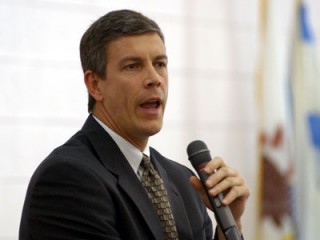
Duncan Arne biography
Date of birth : 1964-11-06
Date of death : -
Birthplace : Chicago, Illinois, USA
Nationality : American
Category : Politics
Last modified : 2010-07-05
Credited as : Educator and public servant, U.S. Secretary of Education, Obama administration
0 votes so far
Former Chicago Public Schools CEO Arne Duncan was confirmed by the U.S. Senate as secretary of education on January 20, 2009. Seen as a reformer who retained the ability to effectively work with opposing factions, his addition to President Barack Obama's cabinet was widely welcomed. How he would fare on the national scene, however, remained to be seen.
Duncan was born on November 6, 1964, in Chicago, Illinois, and grew up in the city's Hyde Park neighborhood. His late father taught at the University of Chicago, and his mother founded and ran a local tutoring program. Nearly six-and-a-half feet tall, Duncan was a star basketball player in his youth and was courted by both Harvard and Princeton Universities to play. He opted for Harvard, where he co-captained the basketball team and was an Academic All-American. In 1987 he graduated magna cum laude with a degree in sociology, but basketball was not yet out of his system. That led to a failed tryout to join the Boston Celtics and a four-year stint playing professionally in Australia's National Basketball League (1987-1991). He also tutored underprivileged students in Australia. Then in 1992, Duncan returned to Chicago to follow the family trade.
Duncan picked up his career in education as director of Chicago's Ariel Education Initiative, a philanthropic effort to improve schooling for poor children. In 1998 he signed on with the Chicago public schools as director of magnet schools and deputy chief of staff. Just three years later, when he was a mere 36 years old and reportedly had never even had his own secretary, Duncan was hired as CEO of the third-largest school system in the United States.
Despite his comparative inexperience, Duncan ably fulfilled his new obligations. He quickly acquired a reputation for both innovation and results, managing to work well with traditional adversaries within school systems from unions to management. By employing controversial techniques, from closing failing schools to supporting charter schools to instituting performance pay for teachers and students, a real turnaround eventually came about. One of the most telling statistics, for instance, was the increase in the number of students meeting or surpassing state standards---just 38% did so in 2001, a figure that rose to 68% by 2007.
A friend of fellow basketball aficionado Obama since the early 1990s, Duncan served as education advisor to his 2008 presidential campaign. After Obama's win, the president-elect nominated Duncan to fill the cabinet post of secretary of education. That nomination was heartily welcomed in most quarters and handily confirmed by the U.S. Senate on January 20, 2009. And although Duncan was a bit short on familiarity with national politics or higher education at the time, he had already proven his mettle as a quick learner and team player.
















